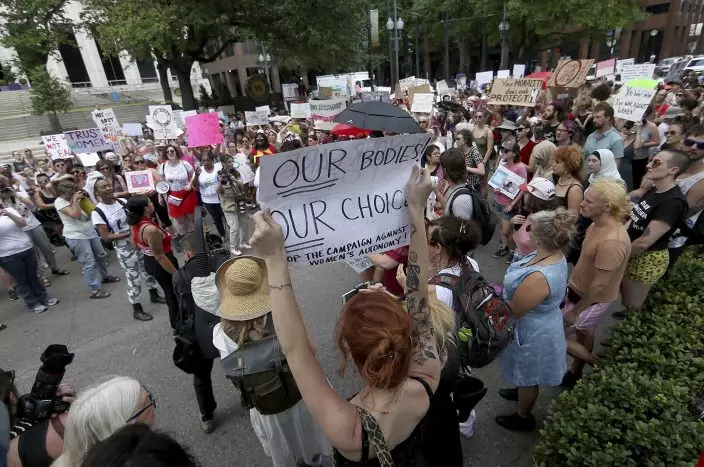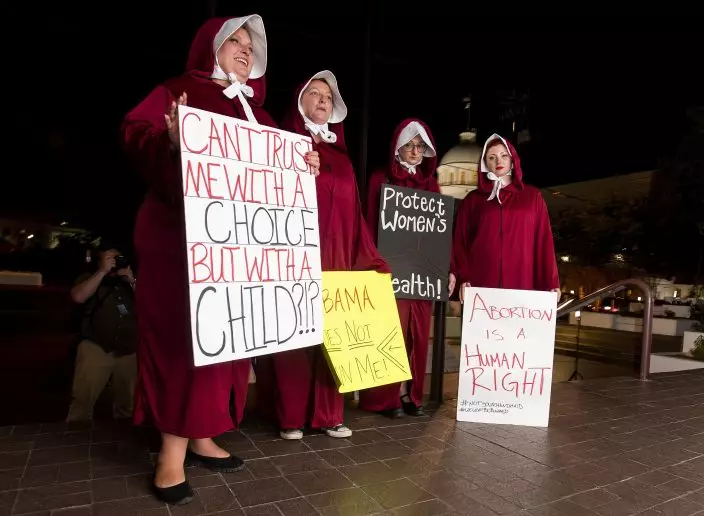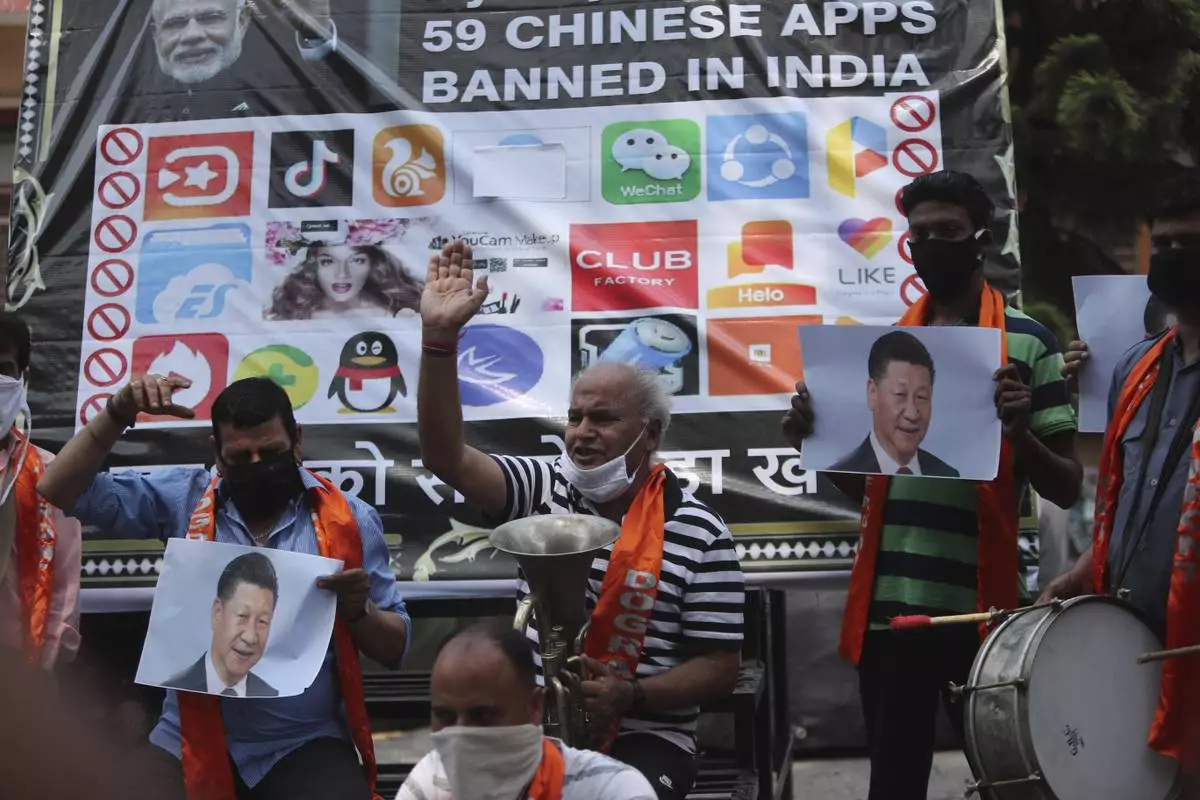Even as the anti-abortion movement celebrates the sweeping bans passed in several states, it's divided by a widening rift over whether those prohibitions should apply to victims of rape and incest.
The debate pits those who believe any abortion is immoral against those who worry that a no-exception stance could be harmful to some Republican candidates in upcoming elections. A Gallup poll last year found that 77% of Americans support exceptions in cases of rape and incest.
"There is a media spotlight shining on this issue," said Clarke Forsythe, senior counsel with Americans United for Life. "State leaders need to be prudent and reflect not only on state elections but also national elections, and the pace of change the public might accept."

FILE - In this Wednesday, May 22, 2019, file photo, hundreds of pro-abortion rights supporters block Poydras Street outside One Shell Square to protest anti-abortion legislation during a "Just Laws or Outlaws: Take to the Streets," event organized by the New Orleans Abortion Fund, Women With a Vision, the New Orleans Peoples' Assembly and BYP 100. Even as the anti-abortion movement celebrates passage of sweeping bans in several states, a rift is widening between activists who oppose exceptions for rape and incest, and other abortion opponents, including many Republican politicians, who support those exceptions. (Michael DeMockerThe Times-Picayune via AP, File)
There's potential for even more division.
The Federalist, an online magazine influential in conservative and anti-abortion circles, ran an article this week by two abortion opponents suggesting that women who induce their own abortions should be prosecuted for murder. The position is at odds with the pro-women rhetoric of leading anti-abortion groups.
"We're 100% percent against prosecuting women." said Kristi Hamrick, spokeswoman for Students for Life of America.

FILE - In this Tuesday, May 14, 2019, file photo, protesters, dressed as handmaids, from left, Bianca Cameron-Schwiesow, Kari Crowe, Allie Curlette and Margeaux Hartline, wait outside of the Alabama statehouse after a ban on nearly all abortions passed the senate in Montgomery, Ala. The measure now goes to Gov. Kay Ivey, who has not said whether she supports the measure. Even as the anti-abortion movement celebrates passage of sweeping bans in several states, a rift is widening between activists who oppose exceptions for rape and incest, and other abortion opponents, including many Republican politicians, who support those exceptions. (Mickey WelshThe Montgomery Advertiser via AP, File)
Divisions over rape-and-incest exceptions have existed within the anti-abortion movement for years, but have become more apparent as several states in the South and Midwest enacted tough bans on abortion.
Only the ban in Georgia includes an exception for victims of rape or incest — and then only if the woman files a police report first. Measures enacted in Alabama, Ohio, Kentucky, Mississippi and Missouri do not contain those exceptions, nor does a measure nearing final approval in Louisiana.
Alabama's ban is the toughest: Performing an abortion at any stage of pregnancy would be a felony punishable by up to 99 years or life in prison. The only exception would be when the woman's health is at serious risk.
Some Republicans in Alabama's GOP-controlled Senate, as well as minority Democrats, were enraged when an exemption for rape and incest was removed without a roll call vote. The flare-up prompted a five-day postponement before final approval came on May 14.
Emboldened by the bans, 17 anti-abortion leaders sent a letter Wednesday to Republican National Committee chairwoman Ronna McDaniel requesting a meeting and urging the GOP to explicitly oppose exceptions for rape and incest.
The signatories included Kristan Hawkins, president of Students for Life, the Rev. Frank Pavone, director of Priests for Life, and activist Ryan Bomberger , the son of a woman who was impregnated by a rapist but opted against having an abortion.
"We understand that issues like rape and incest are difficult topics to tackle." the letter said. "Nevertheless, it is our view that the value of human life is not determined by the circumstances of one's conception or birth."
McDaniel, in reply, described the GOP as "the party of life" and added, "I welcome any discussion about how to protect it."
Discussing the bans in an interview with CNN on May 17, McDaniel said, "Personally, I would have the exceptions. ... But we are a party that is a broad tent."
President Donald Trump, House Minority Leader Kevin McCarthy of California and Senate Majority Leader Mitch McConnell of Kentucky also have distanced themselves from the no-exceptions bans.
"I am strongly Pro-Life, with the three exceptions - Rape, Incest and protecting the Life of the mother," Trump tweeted on May 18. "We must stick together and Win.... ....for Life in 2020. If we are foolish and do not stay UNITED as one, all of our hard fought gains for Life can, and will, rapidly disappear!"
In several state legislatures, debate over the exceptions produced dramatic moments.
Samantha Blakely, 25, a travel industry employee from Birmingham, testified at a hearing on the Alabama ban about her decision to have an abortion after a rape in 2017 resulted in pregnancy. She says ban supporters ignore the difficult situations faced by women like her.
"They have absolutely lost sight of victims," Blakely told The Associated Press. "There are blinders on, to block out victims of rape and incest."
If the new law had been in effect when she was raped, Blakely said, she would have done anything to end the pregnancy — possibly including suicide.
"I knew I would not be emotionally or mentally or financially stable enough to give that child what they needed," Blakely said. "And I didn't know exactly how dangerous my rapist was at the time. ... I knew he would try to somehow stay in my life and use that child to control me. And the thought of those things, I'd rather be dead."
In South Carolina, where the legislative session ended before a proposed abortion ban could be passed, there was bitter debate over whether to include an exception for rape and incest.
GOP state Rep. Nancy Mace objected angrily after a fellow Republican lawmaker passed out a flier suggesting that a rapist who impregnates his victim should be referred to as a "sperm donor."
After Mace proposed adding the exceptions to the bill, another GOP colleague protested, while referring to rape in a way that appeared to diminish its seriousness as a violent crime.
"The question is whether another life should be taken because of a bad act," said Rep. John McCravy told fellow lawmakers.
In arguing for the exemption, Mace had shared her own story of being raped, one of several female lawmakers to do so amid the heated state abortion debates.
The abortion bill eventually passed the House with the rape-and-incest provision included, but did not get traction in the South Carolina Senate.
Stephen Schneck, a retired political science professor at the Catholic University of America, personally opposes abortion but believes most Americans have a nuanced view — favoring neither Alabama-style bans nor unrestricted abortion access at any phase of pregnancy.
"Politically, promoting the all-or-nothing positions makes sense for fundraising and mobilizing activists on both sides," he said via email. "But it also makes it impossible for the country as a whole to come together on the issue."
None of the abortion bans enacted this year has taken effect. All are expected to be blocked by federal courts, with ban supporters hoping appeals might lead to the U.S. Supreme Court.
The recent Federalist article, by Georgi Boorman and James Silberman, took aim at the growing interest in do-it-yourself abortions, in which a woman could receive the abortion drug misoprostol by mail and terminate a pregnancy without involvement of a medical professional.
The authors called for total abolition of abortion, so that "the murder of an unborn boy or girl will be treated exactly the same as the murder of a toddler or older child."
Associated Press writers Ricardo Alonso-Zaldivar in Washington, D.C., and Christina A. Cassidy in Atlanta contributed to this report.










